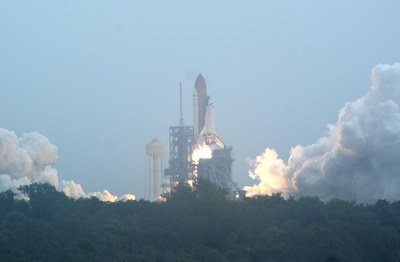A ten-year experimentby Jeff Foust
|
| Would people be interested in long-form articles and commentary about the space issues of the day? |
The idea behind The Space Review is more than ten years old—closer to 20, in fact. Starting in the fall of 1993, I edited SpaceViews, originally the newsletter of the Boston chapter of the National Space Society, but something that took on a life of its own as the Internet, through email and, later, the web, offered global channels of distribution. It also allowed for longer articles and discussions about space issues of the day, no longer encumbered by the page counts of a print publication.
SpaceViews met its demise in 2000 during the boom-and-bust cycle of the dot.com era (a story too long, and possibly too boring, to go into detail here.) As far back as 2001 I was thinking of a new publication that would allow for the longer articles and commentary that seemed to be missing in the space news ecosphere of the time, and I even had a name in mind: The Space Review. But life, as it so often does, intervened, and the idea sat on the backburner for over a year.
The loss of Columbia, ten years ago February 1, brought the idea back to life. Now, more than ever, there was the need to discuss the big space issues of the day: what was the future of NASA, and of spaceflight in general? What should be doing instead, and why? These are issues not easily discussed in short news articles or blog posts.
I put together that initial article and the basic form of the web site in the course of a few days, and on the morning of February 11, 2003, published the site and sent out an email to a small group of people, letting them know about this new, highly experimental, endeavor.
| So is this experiment a success? That would imply the experiment is over, and that’s not the case. |
It’s tempting to write something like, “And the rest, as they say, was history,” but that hasn’t been the case. The Space Review gradually developed a readership, particularly in the space community, and contributors followed. But the success this publication has enjoyed wasn’t inevitable, but instead through lots of hard work (including hundreds of sleepless Sunday nights putting together each issue) and thoughtful contributions from people inside and outside the space industry, from the US and around the world. And there are many others to thank, far too many to list here.
It's gratifying to hear from industry insiders and others in the space community that they continue to find The Space Review informative and useful. Author and expert James Oberg—himself an occasional contributor to The Space Review—had this to say when I told him about the upcoming anniversary:
I’m grateful for Jeff’s commemoration project providing the impetus for expressing views that should have been put into print long ago: the news reports and websites he runs are an absolutely unique, comprehensive, and dispassionately reliable chronicle of these revolutionary years of the space age, The fact that he is diligently at this task is an enormous load-relief to me and I’m sure many other space watchers, who can focus on specific issues, specific travels, specific event responses, knowing that Jeff “has their back” to maintain a log of events with commentaries, available whenever they need to get brought back up to date. Attaboy and molodets, Mr. Foust. May your tribe increase.
Just as gratifying, though, are emails from people, particularly students, who have stumbled across articles in Google searches or other means and found them useful for a paper, project, or just raising their awareness of or interest in topics covered here. After all, the space community can’t just keep talking to itself.
So is this experiment a success? That would imply the experiment is over, and that’s not the case: there are as many big issues regarding the future of spaceflight today as there were 10 years ago (see “Asking the big questions for the next ten years”, The Space Review, this issue.) And there’s plenty on my to-do list to improve The Space Review in the months and, hopefully, many years to come.
Fortunately, this experiment isn’t a solo one, and I thank you for being a part of it as it continues into its second decade.
